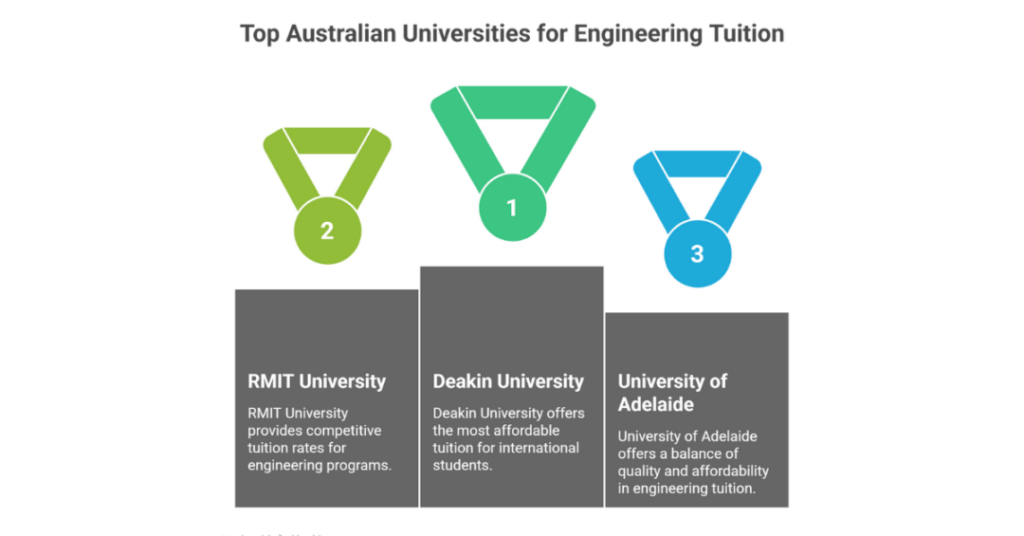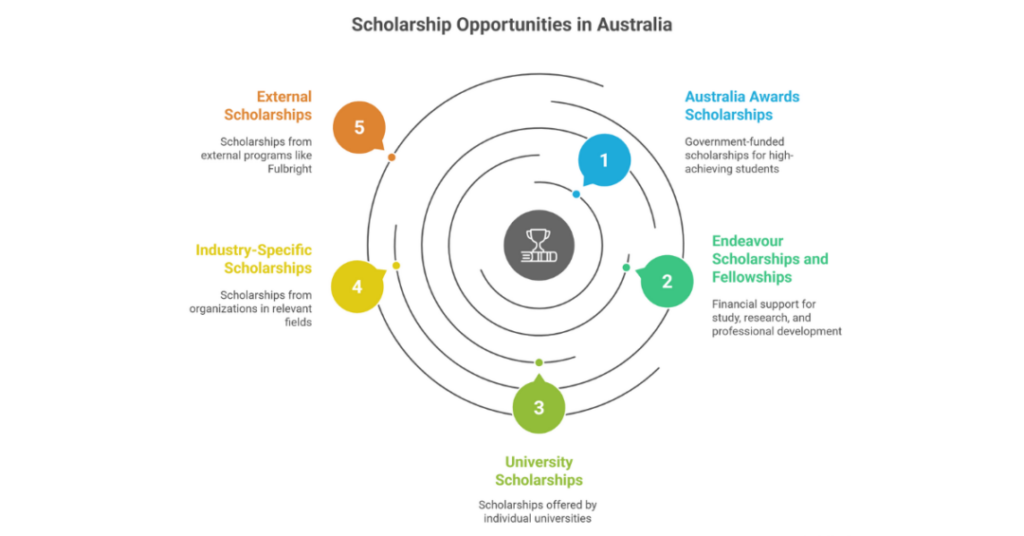25 August 2025
7 minutes read
8 Best Universities in Australia for MS in Electronics for Indian Students

Key Takeaways
- Best universities in Australia for MS in Electronics like ANU, UNSW, Sydney, and Melbourne offer globally ranked programs with strong industry links.
- Tuition fees range AUD 32,000–50,000 per year, but scholarships such as Australia Awards and university grants can ease the financial load.
- Compare programs, entry requirements, and specializations early to align with your career goals in areas like IoT, VLSI, or sustainable energy.
Are you an aspiring electrical engineer looking to pursue a postgraduate degree in electronic engineering? Australia offers a plethora of opportunities for international students to further their education and kickstart their careers in this field.
In this comprehensive guide, we’ll delve into the best universities in Australia for MS in electronics, helping you make an informed decision about your academic journey.
Top Universities in Australia for Electronic Engineering
When it comes to pursuing a Master’s in Electronics Engineering in Australia, several prestigious institutions stand out.
Here is the list of the best universities in Australia for MS in Electronics
1. Australian National University (ANU)
Australian National University (ANU) is renowned for its cutting-edge engineering programs. The Master of Engineering (Electrical and Electronic) degree at ANU offers a diverse range of courses, including control engineering, internet of Things (IoT), and more. ANU’s strong research focus provides opportunities for students to engage in groundbreaking projects.
ANU has a reputation for producing some of the finest electrical engineers in the world. With a strong emphasis on research and innovation, ANU’s program ensures that students are well-prepared to tackle real-world challenges in the field of electronic engineering.
2. University of Sydney
The University of Sydney offers a Master of Engineering (Electrical) program, focusing on electrical systems, power electronics, and telecommunications. With its rich history and state-of-the-art facilities, this university attracts students from all over the world.
The University of Sydney’s program not only provides a strong theoretical foundation but also emphasizes practical applications. Students have access to cutting-edge laboratories and research opportunities, ensuring they are well-equipped for the demands of the industry.
3. University of Technology Sydney (UTS)
University of Technology Sydney (UTS) offers a Master of Engineering in Electrical and Electronic Engineering. Their curriculum is designed to equip students with the skills required for the evolving field of electronics engineering, such as microelectronics and signal processing.
UTS is known for its industry connections and collaborations, providing students with opportunities to work on real-world projects and internships with leading companies. This practical experience sets UTS graduates apart in the job market.
4. University of Adelaide
The University of Adelaide offers a Master of Engineering (Electrical and Electronic) program. It is known for its strong emphasis on practical learning and industrial connections, providing students with hands-on experience.
The University of Adelaide’s program focuses on developing practical skills through projects, internships, and industry partnerships. Graduates are well-prepared to enter the workforce with both technical knowledge and practical experience.
5. RMIT University
RMIT University, located in Melbourne, offers a Master of Engineering (Electrical and Electronic Engineering) program. This university stands out for its professional engineering courses, preparing students for the industry’s demands.
RMIT’s program is designed to bridge the gap between academia and industry. With a strong focus on practical skills and industry engagement, graduates are ready to take on roles as electronics engineers, systems analysts, and more.
6. University of New South Wales (UNSW)
University of New South Wales (UNSW) provides a range of electrical and electronic engineering programs, including Master of Engineering specializations. They offer international courses and have a reputation for producing top-notch graduates.
UNSW’s program emphasizes research and innovation, giving students the opportunity to work on cutting-edge projects. With access to world-class facilities and industry connections, graduates are well-prepared for leadership roles in the electronics engineering field.
7. University of Queensland
The University of Queensland offers a Master of Engineering (Electrical and Electronics). It is known for its diverse range of specializations, including VLSI design and embedded systems.
The University of Queensland’s program provides students with a solid foundation in electronics engineering while allowing them to specialize in their areas of interest. Graduates are equipped with the skills and knowledge to excel in various roles within the field.
8. Deakin University
Deakin University offers a Graduate Certificate in Electrical and Electronics Engineering, which is perfect for those looking to add a specialization to their existing skill set.
Deakin’s program is flexible and designed to accommodate working professionals. It allows students to enhance their knowledge in specific areas of electronics engineering, making them more competitive in the job market.
Comparison Table – Best Universities in Australia for MS in Electronics
| University | Ranking & Reputation | Specializations (Subject Focus) | Industry & Network Connections | Recommended For |
|---|---|---|---|---|
| Australian National University (ANU) | Consistently among top engineering universities in global ranking | IoT, control engineering, advanced communication systems | Collaborations with global research networks | Students who want to build research careers and find innovative solutions in sustainable electronics |
| University of Sydney | One of Australia’s oldest universities with high global subject ranking | Power electronics, telecommunications, energy systems | Access to strong alumni network and labs | Recommended for those who want a mix of theory + practical electronic engineering courses |
| University of Technology Sydney (UTS) | Top young university with practical orientation | Microelectronics, signal processing, embedded networks | Known for industry-linked electronic engineering courses in Australia | Students looking to compare courses in Australia with industry-linked electronic engineering degrees |
| University of Adelaide | High subject ranking in engineering universities | Signal processing, control, power systems | Partnerships with energy sector companies | Recommended for students who have completed undergraduate degrees and want hands-on industry exposure |
| RMIT University (Melbourne) | Renowned for professional electronic engineering degrees | Systems analysis, electronic devices, sustainable energy | Located in Melbourne, with extensive corporate network | Recommended for working professionals looking to build practical skills |
| University of New South Wales (UNSW) | Top 50 worldwide in QS subject ranking for engineering universities | Robotics, electronics design, computer networks | Excellent industry links, global alumni | Students aiming for leadership roles and advanced electronic engineering degrees |
| University of Queensland (UQ) | Member of Group of Eight, high global ranking | VLSI design, embedded systems, sustainable electronics | Strong research network in Australia & globally | Recommended for students wanting to specialize in VLSI & embedded systems |
| Deakin University | Known for flexible electronic engineering courses in Australia | Short-term specialization courses | Collaboration with La Trobe University & industry | Professionals wanting to add specialization alongside work |
| University of Melbourne | Consistently top in QS ranking for engineering universities | Energy systems, sustainable electronics, networks | Extensive global research network | Highly recommended for global recognition and advanced research opportunities |
| La Trobe University | Mid-tier but growing in engineering universities ranking | Applied electronics, networks, renewable energy | Partnerships with local industries | Students looking for affordable electronic engineering degrees in Australia |
Tuition Fees and Scholarship Opportunities
When considering pursuing a Master’s in Electronics Engineering in Australia, it’s essential to be aware of the tuition fees and available scholarship opportunities. Here’s an overview of what you can expect in terms of costs and financial aid:
Tuition Fees
Tuition fees for international students in Australia can vary depending on the university, program, and whether you choose to study full-time or part-time.

On average, you can expect the following approximate tuition fees:
- Australian National University (ANU): ANU’s Master of Engineering programs typically range from AUD 40,000 to AUD 50,000 per year for international students.
- University of Sydney: Tuition fees for the Master of Engineering (Electrical) program at the University of Sydney are in the range of AUD 45,000 to AUD 50,000 per year for international students.
- University of Technology Sydney (UTS): UTS charges approximately AUD 42,000 to AUD 48,000 per year for the Master of Engineering in Electrical and Electronic Engineering.
- University of Adelaide: For the Master of Engineering (Electrical and Electronic) program at the University of Adelaide, international students can expect tuition fees in the range of AUD 32,000 to AUD 38,000 per year.
- RMIT University: RMIT’s Master of Engineering (Electrical and Electronic Engineering) typically costs international students around AUD 34,000 to AUD 39,000 per year.
- University of New South Wales (UNSW): Tuition fees for UNSW’s Master of Engineering programs are approximately AUD 42,000 to AUD 48,000 per year for international students.
- University of Queensland: The University of Queensland’s Master of Engineering (Electrical and Electronics) program generally charges international students between AUD 38,000 and AUD 44,000 per year.
- Deakin University: Tuition fees for Deakin University’s Graduate Certificate in Electrical and Electronics Engineering range from AUD 25,000 to AUD 30,000 for international students.
Please note that these figures are approximate and can vary. It’s essential to check the specific program and university websites for the most up-to-date tuition fee information.
Scholarship Opportunities
Australia offers various scholarship opportunities for international students pursuing postgraduate degrees, including those in electronics engineering.

Scholarships can significantly alleviate the financial burden of tuition fees and living expenses. Here are some scholarship options to consider:
1. Australia Awards Scholarships: These prestigious scholarships are offered by the Australian government to high-achieving international students from eligible countries. They cover tuition fees, living expenses, and even overseas student health coverage.
2. Endeavour Scholarships and Fellowships: The Australian government’s Endeavour program provides financial support for international students to undertake study, research, or professional development in Australia. It includes opportunities for postgraduate study.
3. University Scholarships: Many Australian universities offer scholarships specifically for international students. These scholarships can vary in terms of eligibility criteria, application deadlines, and coverage. Check the respective university websites for details.
4. Industry-Specific Scholarships: Some organizations and industries in Australia offer scholarships for students pursuing degrees in fields relevant to their sector. For example, engineering firms may provide scholarships for electronics engineering students.
5. External Scholarships: Additionally, there are external scholarship programs, such as the Fulbright Program, which provides opportunities for international students to study in Australia.
To increase your chances of securing a scholarship, it’s essential to research and apply well in advance of your intended start date. Pay close attention to application deadlines and eligibility requirements, as they can vary widely. Scholarships can be highly competitive, so prepare a strong application that highlights your academic achievements and contributions to your field
Conclusion
Australia’s universities and colleges offer diverse programs in electronic engineering, making it a prime destination for postgraduate studies in this field. With its top-notch education, stunning landscapes, and thriving job market, Australia provides an excellent environment for aspiring electrical engineers.
So, explore your options, choose the right university, and embark on your journey toward a successful career in electronics engineering. With the knowledge and experience gained from these esteemed institutions, you’ll be well-prepared to make your mark in the world of electrical engineering.
Finding the right electronic engineering degrees in Australia can feel overwhelming with so many courses and universities to compare. That’s where Ambitio comes in. Our experts help you find the best engineering universities, guide you through entry requirements, and recommend the right courses in Australia based on your profile.
FAQs
What are the entry requirements for these programs?
Entry requirements vary from one university and program to another. Typically, you will need a relevant bachelor’s degree and may have to fulfill English language proficiency requirements.
How long does it take to complete a Master’s in Electronics Engineering in Australia?
It usually takes 1 to 2 years to graduate, depending on the program and whether you study full-time or part-time.
What are the job opportunities after completing a Master’s in Electronics Engineering in Australia?
Graduates can pursue careers as electronics engineers, systems analysts, network engineers, and more. Australia offers a thriving job market for engineering professionals.
Are there internship opportunities during the programs?
Many universities in Australia offer internship programs to provide practical experience to their students, enhancing their job prospects.
Can I work part-time while studying for my Master’s in Australia?
Yes, international students are generally allowed to work part-time during their studies. However, there may be restrictions, so it’s essential to check the specific regulations of your visa.

You can study at top universities worldwide!
Get expert tips and tricks to get into top universities with a free expert session.
Book Your Free 30-Minute Session Now! Book a call now




























